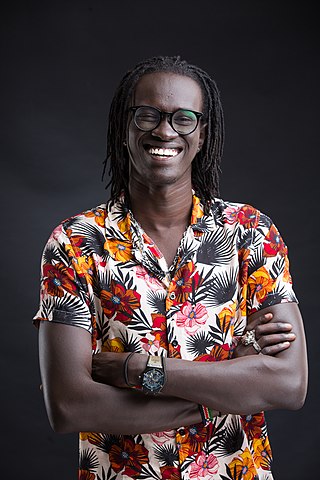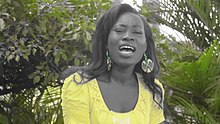
Juba is the capital and largest city of South Sudan. The city is situated on the White Nile and also serves as the capital of the Central Equatoria State. It is the world's newest capital city to be elevated as such, and had a population of 525,953 in 2017. It has an area of 52 km2 (20 sq mi), with the metropolitan area covering 336 km2 (130 sq mi).

Salva Kiir Mayardit, also known as Salva Kiir, is a South Sudanese politician who has been the President of South Sudan since its independence on 9 July 2011. Prior to independence, he was the President of the Government of Southern Sudan, as well as First Vice President of Sudan, from 2005 to 2011. He was named Commander-in-Chief of the Sudan People's Liberation Army (SPLA) in 2005, following the death of John Garang.

Yasir Said Arman is a Sudanese politician and a leading figure in the Sudan People's Liberation Movement (SPLM). He was the SPLM's deputy secretary-general for the northern sector and its spokesman. Initially he was presented as the SPLM candidate for the April 2010 presidential election, but the party later chose to boycott the presidential election. After South Sudan's independence on July 9, 2011, and the creation of a separate SPLM party in the Republic of the Sudan, Arman has become the secretary general of the SPLM-N.

Sudan People's Liberation Movement–North, or SPLM–N, is a political party and militant organisation in the Republic of Sudan, based in the states of Blue Nile and South Kordofan. As of 2017, its two factions, SPLM-N (Agar) and SPLM-N (al-Hilu) were engaged in fighting each other and against the government of Sudan.

The 2011–2013 protests in Sudan began in January 2011 as part of the Arab Spring regional protest movement. Unlike in other Arab countries, popular uprisings in Sudan had succeeded in toppling the government prior to the Arab Spring in 1964 and 1985. Demonstrations in Sudan however were less common throughout the summer of 2011, during which South Sudan seceded from Sudan, but resumed in force later that year and again in June 2012, shortly after the government passed its much criticized austerity plan.

The Anataban Campaign is an artist collective based in Juba, South Sudan. The group uses street theater, graffiti, murals, sculpture and poetry to foster public discussion about the issues of social injustice and government accountability, and transparency. Anataban members see solidarity, courage, integrity, inclusion, non-violence and political neutrality as the important values guiding their work.

Amal Khalifa Idris Habani is a Sudanese journalist.

The Sudanese transition to democracy is a series of political agreements among Sudanese political and military forces for a democratic transition in Sudan that began in July 2019. Omar al-Bashir overthrew the democratically elected government of Sadiq al-Mahdi in 1989 and was himself overthrown in the 2019 Sudanese coup d'état, in which he was replaced by the Transitional Military Council (TMC) after months of sustained street protests. Following further protests and the 3 June Khartoum massacre, TMC and the Forces of Freedom and Change (FFC) alliance agreed on 5 July 2019 to a 39-month transition process to return to democracy, including the creation of executive, legislative and judicial institutions and procedures.
This article lists events from the year 2019 in South Sudan
The Sudanese peace process consists of meetings, written agreements and actions that aim to resolve the War in Darfur, the Sudanese conflict in South Kordofan and Blue Nile, and armed conflicts in central, northern and eastern Sudan.

The 2019–2022 Sudanese protests were street protests in Sudan which began in mid-September 2019, during Sudan's transition to democracy, about issues which included the nomination of a new Chief Justice and Attorney General, the killing of civilians by the Rapid Support Forces (RSF), the toxic effects of cyanide and mercury from gold mining in Northern state and South Kordofan, opposition to a state governor in el-Gadarif and to show trials of Sudanese Professionals Association (SPA) coordinators, and advocating the dismissal of previous-government officials in Red Sea, White Nile, and South Darfur. The protests follow the Sudanese Revolution's street protests and civil disobedience of the early September 2019 transfer of executive power to the country's Sovereignty Council, civilian prime minister Abdalla Hamdok, and his cabinet of ministers. Hamdok described the 39-month transition period as defined by the aims of the revolution.

Peter Biar Ajak is a South Sudanese peace activist, scholar, and former political prisoner who was arbitrarily detained in South Sudan from July 2018 to January 2020. Forced to flee a South Sudanese hit squad in July 2020, he now resides in the United States, where he continues to advocate for peace and democracy in South Sudan. While in the United States, he has served as a visiting fellow at the Africa Center for Strategic Studies and a Reagan-Fascell Democracy Fellow at the National Endowment for Democracy.

Akau Jambo is a South Sudanese stand-up comedian, actor and an activist. He is the founder of Juba International Comedy Festival the first comedy festival in South Sudan. Akau is also a Mandela Washington Fellow, 2022 cohort.

On 25 October 2021, the Sudanese military, led by General Abdel Fattah al-Burhan, took control of the Government of Sudan in a military coup. At least five senior government figures were initially detained. Civilian Prime Minister Abdalla Hamdok refused to declare support for the coup and on 25 October called for popular resistance; he was moved to house arrest on 26 October. Internet outages were reported. Later the same day, the Sovereignty Council was dissolved, a state of emergency was put in place, and a majority of the Hamdok Cabinet and a number of pro-government supporters were arrested. As of 5 November 2021, the list of those detained included "government ministers, members of political parties, lawyers, civil society activists, journalists, human rights defenders, and protest leaders", who were held in secret locations, without access to their families or lawyers.
Apollonia Mathia was a South Sudanese journalist and social activist. Mathia was one of the founders of the Association for Media Women in South Sudan (AMWISS) as well as Union of Journalists of Southern Sudan (UJOSS).
Aguil Chut Deng Acouth, also known as Aguil de'Chut Deng or Aguil Chut-Deng, was a South Sudanese revolutionary and activist. She was a member of "Katiba Banat", the women's battalion of the Sudan People's Liberation Army (SPLA), during the Second Sudanese Civil War.
Achai Wiir is a South Sudanese philanthropist and businesswoman. Achai is also the founder of the Achai Wiir Foundation, a non-profit organisation working in supporting vulnerable people in South Sudan.
Juba Teaching Hospital is a government-run 512-bed teaching hospital in Juba, South Sudan. The hospital functions as the ultimate referral hospital for the nation.
In July, September, and October 2022, clashes broke out between the Hausa people and Funj and Berta peoples over land disputes in Blue Nile state in southeastern Sudan. Over the course of several attacks and massacres, hundreds of civilians were killed up until the violence ended in January 2023.
Manasseh Mathiang is a South Sudanese musician and human rights activist. Having made a living as a musician for many years, in 2021 he was exiled from South Sudan for criticizing the government. In response, he began using his music to solely to promote activism and, together with other exiled South Sudanese artists, formed Antaban, meaning “I am tired” in Arabic. For his criticism of the government, Mathiang has remained a fugitive and is often forced to flee. He currently operates out of Nairobi, Kenya where he serves as executive director of Hagiga Ltd, an NGO aimed at promoting freedom of expression through art.












